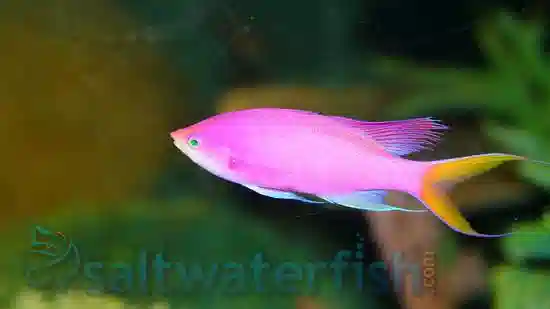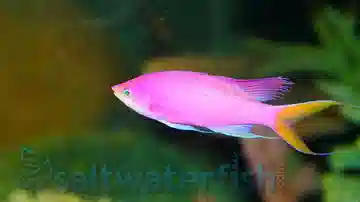Expert Only
Purple Queen Anthias
Mirolabrichthys tuka
(1 Reviews)

Expert Only
Purple Queen Anthias
Mirolabrichthys tuka
(1 Reviews)
{{ item.name }}
Size: {{ item.extra_field_3 }}
${{ getFormattedPrice(item.saleprice) }} ${{ getFormattedPrice(item.price) }}
To join the waiting list, click here
Free Shipping
With
$199.00
or more in Marine Life.
More details...
Purple Queen Anthias Care Facts
| Care Level: | Expert |
|---|---|
| Temperament: | Peaceful |
| Diet: | Carnivore |
| Reef Safe: | Yes |
| Minimum Tank Size: | 60 gallons |
| Max Size: | 7 inches |
Purple Queen Anthias (Mirolabrichthys tuka): A Comprehensive Guide for Saltwater Marine Aquariums
In the world of marine aquariums, the Purple Queen Anthias, scientifically known as Mirolabrichthys tuka, is a captivating and vibrant species that has captured the hearts of aquarists worldwide. This fact-based guide offers valuable insights into the Purple Queen Anthias, including its habitat, reef compatibility, size, lifespan, dietary needs, aquaculture availability, sexual dimorphism, and much more. Whether you're a seasoned hobbyist or just starting, this information will help you decide to keep this species in your saltwater aquarium.
Habitat of Purple Queen Anthias
The Purple Queen Anthias is native to the Indian and Western Pacific Oceans, specifically in the waters surrounding the Maldives, Indonesia, and Australia. In the wild, they inhabit coral-rich reef slopes and drop-offs, usually at depths ranging from 50 to 100 feet (15 to 30 meters).
Is the Purple Queen Anthias Reef Safe?
Purple Queen Anthias are considered reef-safe and compatible with coral and other invertebrates in a reef aquarium. They do not exhibit destructive behaviors that can harm corals or the reef structure.
How Big Does the Purple Queen Anthias Get?
These anthias are relatively small, with adult males typically reaching a maximum size of about 4 inches (10 centimeters), while females are slightly smaller.
How Long Does the Purple Queen Anthias Live?
Purple Queen Anthias can live for several years in captivity with proper care. They have an average lifespan of 5 to 7 years.
What the Purple Queen Anthias Eats in Captivity
Purple Queen Anthias primarily feed on zooplankton and small crustaceans in their natural habitat. To replicate their diet in captivity, offer a diverse range of foods, including high-quality marine pellets, frozen foods like Mysis and brine shrimp, and live foods if available. Regular, small feedings throughout the day help mimic their natural feeding behavior.
Aquaculture Availability for the Purple Queen Anthias
Purple Queen Anthias are not commonly aquacultured, which means they are typically collected from the wild. Choose a responsible supplier like Saltwaterfish.com.
Sexual Dimorphism Purple Queen Anthias?
Purple Queen Anthias exhibit sexual dimorphism, where males and females have distinct visual differences. Males are typically larger and display more vibrant colors, with a purple or lavender hue, prominent yellow dorsal fins, and elongated streamers on their tail fin. Conversely, females are smaller and less colorful, often appearing in shades of orange or pink.
Symbiotic Relationships for the Purple Queen Anthias
Purple Queen Anthias are not known for specific symbiotic relationships with other species in their natural habitat. However, they are often found in loose groups or schools, which can provide safety from predators.
Juvenile vs. Adult Coloration of the Purple Queen Anthias
Juvenile Purple Queen Anthias often have more subdued colors compared to adult males. Their colors intensify as they mature into adults, with males displaying the striking purple and yellow hues mentioned earlier.
What is the Purple Queen Anthias's Personality?
These anthias are generally peaceful but can become aggressive towards conspecifics (members of the same species) if kept in small groups. To mitigate aggression, keeping them in larger groups or as a single male with several females is recommended.
Suitable Tank Mates for the Purple Queen Anthias
Here are five compatible tank mates that can coexist peacefully with Purple Queen Anthias:
- Fairy Wrasses (Cirrhilabrus spp.): These colorful wrasses are peaceful and add diversity to your aquarium.
- Firefish Gobies (Nemateleotris spp.): Firefish gobies are peaceful and typically inhabit different areas of the tank.
- Royal Gramma (Gramma loreto): Known for their striking colors, Royal Grammas are generally peaceful and make excellent tank mates.
- Blennies (Ecsenius spp.): Blennies are known for their quirky personalities and adapt well to community aquariums.
- Dwarf Angelfish (Centropyge spp.): Dwarf angelfish are compatible if introduced carefully and monitored for any signs of aggression.
Tank Requirements for the Purple Queen Anthias
Minimum Aquarium Size: A tank with at least 60 gallons capacity is recommended for a small group of Purple Queen Anthias. Larger tanks provide more swimming space and help reduce territorial disputes.
Aquascaping: Create a well-structured aquascape with plenty of hiding spots, live rock, and caves. This mimics their natural habitat and provides shelter and security.
Water Conditions for the Purple Queen Anthias
Maintain stable water parameters with the following guidelines:
- pH: Maintain a stable pH level between 8.1 and 8.4.
- Salinity: Keep the salinity within the range of 1.023 to 1.025.
- Water Temperature: The recommended temperature range is 74°F to 78°F (23°C to 26°C).
- Water Flow: Moderate water flow is ideal, replicating the gentle currents of a reef slope.
Why Choose the Purple Queen Anthias from Saltwaterfish.com
Purchasing Purple Queen Anthias from Saltwaterfish.com ensures you acquire healthy and acclimated specimens from trusted sources. We prioritize the well-being of marine life and provide top-quality fish that are carefully selected and handled to ensure a smooth transition to your aquarium. Purple Queen Anthias can enhance the beauty of your saltwater aquarium with their striking colors and graceful presence, making them a desirable choice for marine enthusiasts.
In conclusion, the Purple Queen Anthias is a captivating addition to a saltwater marine aquarium. Their stunning colors, reef-safe nature, and compatibility with various tank mates make them popular among aquarists. However, it's essential to provide them with a suitable environment, proper diet, and the right tank mates to ensure their well-being in captivity. Remember that maintaining stable water conditions and monitoring their behavior is crucial to their long-term health and happiness in your aquarium.
Expert Only: Items designated as expert only require special care such as a species specific environment, special diet or care, and an expert level, experienced aquarist. Not for beginners. Expert Only items qualify for our live arrival guarantee only, and are exempt from our extended 8 day guarantee.
Very good Purple Queen Anthias for your tank. I have lost this species and don't know why. Purchased a new one which just arrived.
Reviewed by: Brian Dogith on Sept. 11, 2021








